- Will Lawyers In Canada Soon Face A Religious Test? The Hypersensitive Response Over Canada’s First Openly Christian Law School
- BC Law Society Approves TWU Law School Graduates
- The Cold Chill of the Legal Profession’s Rejection of Religious Freedom
- A Referendum On Religious Freedom
- Lawyers’ Referendum Not Just About TWU – It’s About Our Commitment To The Rule Of Law
- Called To Participate, But Not At The Table
- Hearing Update On Trinity Western University v. Nova Scotia Barristers’ Society
- Breaking News Supreme Court of Nova Scotia rules in favour of Trinity Western University …. more to come
- Space Enough For All: Nova Scotia Supreme Court Makes Decision on Trinity Western University Law School
- The Strange Case of Nova Scotia Barristers’ Society Appeal of the TWU Ruling
- CCCC Granted Intervener Status In TWU Case in British Columbia
- The Onward March of TWU: Next Step The Court of Appeal
- Trinity Western University and the Legal War of Attrition: Isn’t It Time To Let Diversity Flourish?
- Charitable Status of Un-Popular Opinion
- CCCC Denied Intervener Status at Ontario Court of Appeal
- CCCC Granted Intervener Status at the BC Court of Appeal on TWU Case
- Sending a Message to TWU: Your Graduates Need Not Apply
- Recent Happenings: CCCC Files Factum At BC Court of Appeal; Bussey appears on TV
- CCCC at the British Columbia Court of Appeal
- The Experts Demand Deference: Law Societies & TWU
- The Intolerance of Intolerance: The Outrageous Accusation That TWU’s School of Law Is Related To The Orlando Massacre
- Being On the Right Side of History: Where the Offended Take Away Religious Freedom
- Nova Scotia’s Highest Court Rules in Favour of TWU
- Common Sense Prevails at the Nova Scotia Court of Appeal
- Bussey on John Gormley Show
- Nova Scotia Barristers Society Will Not Appeal
- BC Court of Appeal On TWU
- Developing Story: BC Court of Appeal Rules 5-0 in favour of TWU
- The Decision That Has Changed Everything For TWU
- Law Society of BC Appeals TWU To Supreme Court of Canada
- Bussey in Vancouver Sun: Appeal court ruling on Trinity Western University is a game changer
- The Legal Revolution Against Religion
- Supreme Court Grants Leave On TWU
- Supreme Court Grants 9 But Denies 23 Groups Intervener Status In Landmark Case
- Canadian Council of Christian Charities Granted Intervener Status in TWU Case: The Supreme Court Changes Course On TWU Interveners
- Australian Group Interviews Bussey on Equality and Freedom of Religion
- Bruce Clemenger’s Video Message on TWU Case
- Oral Argument of CCCC on TWU at the Supreme Court of Canada
- June 15 TWU Decision To Be Released
- TWU Loses: Canada’s Religious Freedom Forever Altered
- The Constitutional Promise of Religious Freedom Betrayed
- TWU Drops Mandatory Community Covenant
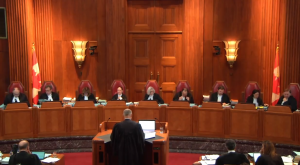
Barry W. Bussey, speaking before the Supreme Court of Canada on the Trinity Western University Case
On November 30 and December 1 the Supreme Court of Canada held hearings on the Trinity Western University School of Law Case. Below are the arguments given by CCCC in-house counsel Barry W. Bussey on December 1. While Barry presented the argument it was a collaborative effort with co-counsel Philip Milley and with our CEO John Pellowe You may watch his presentation beginning at minute 42:30:
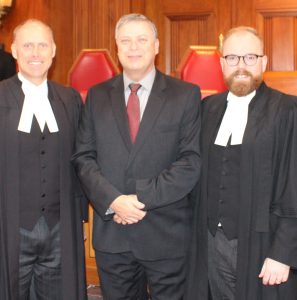
Barry W. Bussey, John Pellowe, Philip A.S. Milley
Canadians take pride in describing their country as a pluralistic and welcoming society. However, the positions of the law societies, we suggest, are anything but. That is not to criticize the law societies, but we are addressing their rationale. The law societies were put in a very difficult position when they were approached by individuals who been offended because, in their view, their identity and dignity was challenged. But pluralism by definition is all about differences and accommodating them. Carving out space for those communities that are in the minority. The law societies are attempting to force those communities with minority views to conform with the majority view. That is not pluralism. Our rights and freedoms are not based on popularity.
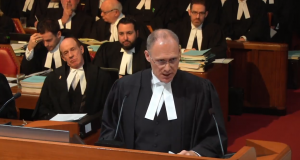
Barry W. Bussey, CCCC Lawyer, speaking before the Supreme Court of Canada
The law societies submit that they cannot and in fact are bound not to accredit TWU. This does not follow. Because, the law societies hold the faulty premise that accreditation is tantamount to endorsement. By this logic government cannot authorize any religious entity. This is a great concern to our 3400 members across Canada who all need government authorization. They need government license for corporate registration; and licenses to operate as nursing homes, soup kitchens, educational institutions; and they all need charitable status. To suggest that all religious entities must conform to the current view of what is acceptable by the government, in order to operate, then we are standing on, I would suggest, the abyss of a revolutionary change in how government has operated to this point regarding religious entities in Canada.
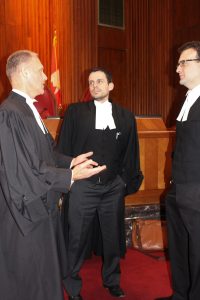
Barry W. Bussey, Andre Schuten, Derek Ross
Should the logic of the law societies be accepted by the court this decision will become the template for how we will resolve differences that exists because of pluralism. Ultimately, we will drive out all differences and become a homogenous society. There will be no longer a Canadian mosaic. The Canada we long for is one where reasonable people may disagree about what is immoral or moral.
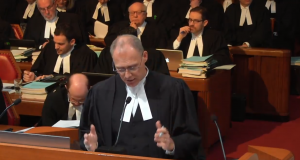
Barry W. Bussey, CCCC Lawyer, speaking before the Supreme Court of Canada
The law society also maintains that when Trinity operates in the public sphere it loses its private religious status and in essence becomes a public actor. The net effect of this position is that Trinity loses Charter protection. Accreditation standards and procedures are not, at their core, a demand that accredited institutions adopt the responsibilities of government. Religious communities are not the arm of government and if they are now to become such we have rejected the whole notion of Pluralism.
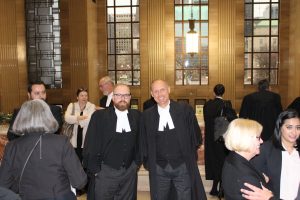
Philip Milley and Barry W. Bussey during a morning break
Today we are at a crossroads. Will the state impose its secular views and practices upon religious organizations thereby diminishing Pluralism and religious equality – as happened in the Ontario courts? Or, will we have a Pluralistic Canada, a diverse community of opinion and practices on matters of social policy such as marriage – as approved in the BC courts?
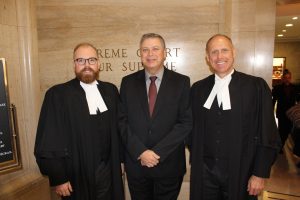
The argument was a collaborative effort of Philip Milley, John Pellowe, Barry W. Bussey
Never before, in the history of Canada, have we seen a case where the state was so well-intentioned, well positioned, and articulate in the law, but, nevertheless sought to impose its own understanding of tolerance, in a most intolerant, illiberal and non-Pluralistic manner, upon a religious minority – as in this case. If ever this court needs to jealously protect religious minorities – it is now.
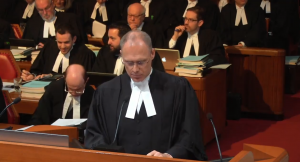
Barry W. Bussey, CCCC Lawyer at the SCC on TWU case


Great comments. It would seem as though the more we work towards tolerance, the opposition to it seems to be increasing and not necessarily from those who one would expect. I’m pleased this is going to the SCC. If we’re going to have a Charter, it must be protected at all costs. Let liberty prevail in this case and bigotry suffer a horrible blow in the name of freedom, liberty and equality for all.
Thank you for being a voice for so many of us who feel our freedom and protection is at risk because of this case.
Barry, my dad would have been so very proud of your excellent presentation. Thank you for being an excellent steward of the keen mind God gave you, and for using it to speak logically and justly, on behalf of Christian professionals. Continuing to pray as we await the decision, that God sharpens the minds and soften the hearts of the SCC.
God bless you!